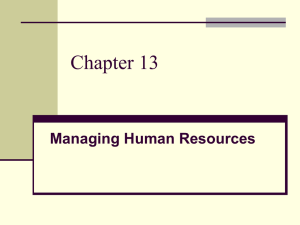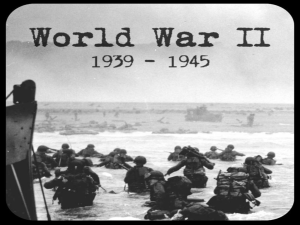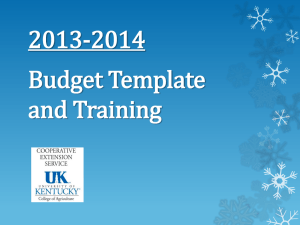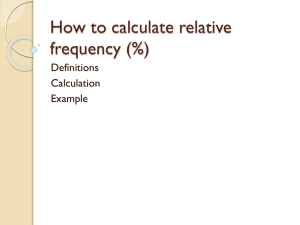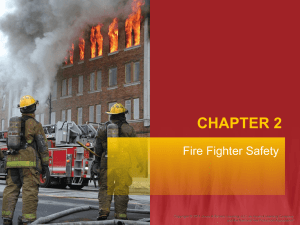Local Government Code Chapter 143 Municipal Civil Service for
advertisement
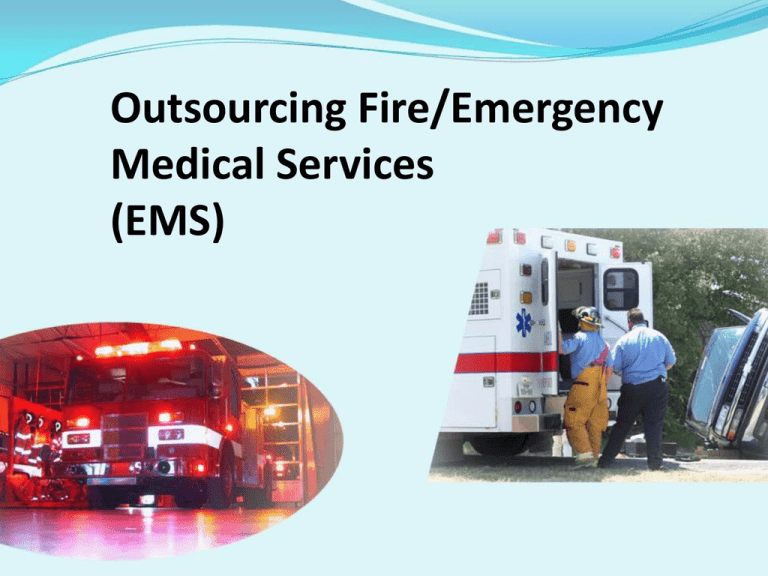
Outsourcing Fire/Emergency Medical Services (EMS) Fire Services • As requested by City Council – Outsourced fire services are generally offered in a specific regional or geographic area serviced by an established volunteer, municipal, district, or state fire department. • Larger metropolitan areas (example: Pasadena, Texas) • California, Florida, Washington – Few private fire service companies exist that provide service to municipalities. – One third-party company has contacted the City EMS Services • As requested by City Council – Several organizations provide contractual emergency medical services (EMS) throughout the country and the region. – Estimated cost to outsource EMS services • $700,000 - $1,000,000 • Use/purchase of assets • Price structure to citizens Budget for City of Copperas Cove Fire/EMS Department FY 2011-2012 $3,405,689 FY 2010-2011 $3,229,145 FY 2009-2010 $3,003,768 FY 2008-2009 $3,103,956 Outsourcing Options • • • • Fire only EMS only Fire and EMS Emergency Services District – Fire and/or EMS – Health Code – Chapter 775 – Voter initiative (petition) LOADING … Local Government Code Chapter 143 Municipal Civil Service for Fire Fighters and Police Officers INTENDED PURPOSE OF LOCAL GOVERNMENT CODE CHAPTER 143 Originally enacted by the state legislature in 1947, the purpose of the Act “is to secure efficient fire and police departments composed of capable personnel who are free from political influence and who have permanent employment tenure as public servants.” Local Government Code, Section 143.001 CIVIL SERVICE ACT • Chapter 143 of the Texas Local Government Code outlines the provisions of the Fire Fighters’ and Police Officers’ Civil Service Act. • This state law dictates to cities that have adopted the law specific provisions of how affected employees must be hired, promoted and disciplined and what benefits they must be paid. THE ADOPTION PROCESS • The Copperas Cove Fire Fighters’ Association has obtained the required number of signatures of registered voters on a petition providing for a vote for or against the proposition adopting the State Fire Fighters Civil Service law, Chapter 143 Local Government Code, for the City of Copperas Cove Fire Department. • On September 6, 2011, the City Council called for this election to be held on Tuesday, November 8, 2011. TIMELINE FOR IMPLEMENTING CHAPTER 143 1. November 8, 2011 2. January 7, 2012 (within 60 days) 3. Between Jan 7, 2012 and October 30, 2012 4. October 30, 2012 Election Day Chief executive appoint Commission members Adoption and publication of rules before implementation Fully Implement Chapter 143 Adoption and publication of rules before implementation • Pays: Longevity, Education, Assignment, Certification, Shift Differential, & Fitness Incentive • Eligibility List: 6 or 12 months • Hiring Process – Interviews? • Classification system • Number of employees under each classification • Salary Pay Plan • Probationary period: 6 or 12 months • Vacation leave • Continue: Birthday leave, Bereavement/Personal time off, Holidays? OPERATIONAL IMPACT OF CHAPTER 143 Loss of “At-Will” Employer Status • The State of Texas is an “At–Will” state meaning that – Employment relations may be broken by either party without cause provided there is no express contract for a definite term. • Civil Service changes the “At-Will” status by providing – Limited circumstances whereby a covered employee may be disciplined and/or terminated. – A Civil Service employee has the right to appeal a disciplinary decision to the Civil Service Commission or to an independent third-party hearing examiner. – The decision of the Civil Service Commission can only be appealed to state district court. Applicant Eligibility, Recruitment, and Selection • Maximum age of 36 for entry–level fire fighters. • Civil Service will reduce the pool of experienced applicants eligible for employment with the Copperas Cove Fire Department. • Additionally, the City’s freedom to reject applicants would be limited. • Hiring is restricted to the applicant list based on the test results and the department must exhaust the unexpired list when hiring individuals. Applicant Eligibility, Recruitment, and Selection (cont.) Current Operations • Testing • Interviews/Background Check • Fitness • 6 month probation Civil Service • Testing • Background Check • Fitness • Minimum of 6 month probation, maximum of 12 month probation During probationary period, employees do not have protections of Civil Service Law. Applicant Eligibility, Recruitment, and Selection (cont.) • Once Civil Service is adopted each fire fighter serving more than six months. – Entitled to civil service classification and status. – Not required to take a competitive examination to remain in their current position. • Civil Service will require fire fighters employed less than six months, at the time of adoption, to undergo competitive testing in order to retain their position. The City will bear the cost of all testing. • An employee of the fire department whose primary duties are emergency medical services is considered to be a fire fighter covered by the Civil Service Act. Service Requirements for Promotion Eligibility • Promotions are governed by the Civil Service rules. • Civil Service requires that personnel be employed for a specified amount of time in one level or position before they are eligible to promote to the next level. • All persons eligible to be considered for promotion must pass an examination, and the highest score on the exam, with few exceptions, must be promoted. • An existing position or a position created in the future either by name or by increase in salary may be filled only from an eligibility list that results from an examination held in accordance with this chapter. Civil Service Commission • Civil Service would require City Council to appoint a Civil Service Commission, which in turn must appoint a Civil Service Director. • The Commission’s duties would include: a. Create and administer extensive civil service rules and procedures. b. Create and administer promotional examinations for each rank in the department. c. Pass judgment on all disciplinary actions taken by Fire Department management. d. Entertain fire fighters’ appeals from a variety of departmental actions, including by job applicants who are disqualified from employment by their physical examination results. Added Administrative Costs • In addition, an aggrieved fire fighter would have the right to bypass Commission procedures and demand that a termination, suspension, demotion or promotional by-pass can be heard by a hearing examiner rather than the Commission. This alternative procedure would require hiring and paying for one–half of the costs of a hearing examiner. Due to the nature of these proceedings, the City would incur additional legal expenses in defending against such lawsuits. • The City of Copperas Cove will be required to provide administrative support and office resources to the Civil Service Commission and Director. Based upon the experiences of other local municipalities who recently implemented Civil Service, an additional administrative position will be required to establish rules, administer payroll and benefits for fire fighters, and to support the Civil Service Director and Commission. Division of City Staff and Tax Burden Division of City Staff • Approval of Civil Service status will provide added benefits for Fire/EMS personnel, but not to other City employees. • The potential exists to create a separate class of employee. Tax Burden • Approval of Civil Service for fire fighters would increase the cost of maintaining the department. • City funding is largely derived from property and sales taxes, with sales taxes nearly flat for the current fiscal year. • Property Tax makes up 45% of General Fund revenue • Sales Tax makes up 19% of the General Fund revenue Loss of Flexibility • Fire/EMS positions already enjoy the same job protections as other City employees as well as certain legal rights that do not exist in the private sector. • At the same time, City management has the flexibility to meet the changing needs of our community by assigning fire personnel according to their talents and best use. • Civil Service would change this flexibility as Department managers would have little or no control over hiring, promotion, discipline, or termination decisions. Temporary Duties - §143.038 • Out-of-Class or Step-Up Pay – A person fills the next higher rank of position as designated by a supervisor. – This may not be construed as a promotion. – The designated person is entitled to the base salary of the higher position plus the designated persons other pay. – Fire fighters assigned to temporarily serve in a higher classification, i.e., Lieutenant or Battalion Chief, are entitled to the base salary of the higher position Salary - §143.041 • All fire fighters in the same classification are entitled to the same base salary. • In addition to the base salary, each fire fighter is entitled to each of the following types of pay, if applicable: – – – – – – (1) (2) (3) (4) (5) (6) longevity or seniority pay educational incentive pay assignment pay certification pay shift differential pay fitness incentive pay Assignment Pay - §143.042 • May authorize assignment pay for fire fighters who perform specialized functions. • Criteria for the pay must be applied equally and be established by ordinance. Certification/Incentive Pay - §143.044 • If each fire fighter is afforded an opportunity to qualify for certification, the municipality's governing body may authorize certification pay. • Same for education and fitness incentive pay. • Criteria for the pay must be applied equally and be established by ordinance for each qualified fire fighter. • Certification/incentive pay is in addition to regular pay. Accumulation & Payment of Sick Leave – §143.045 • A fire fighter is allowed to accumulate 15 workings days of sick leave a year. • The maximum accrual level would be unlimited under Civil Service. • A fire fighter who leaves the classified service for any reason is entitled to receive in a lumpsum payment the full amount of their salary for accumulated sick leave up to 90 days (1,080 hours). Accumulation & Payment of Sick Leave – §143.045 (cont.) • This would be a new cost that would have to be budgeted for annually. • Conditions for payment of accumulated sick leave after the adoption of the Civil Service Law would change and, in fact, increase the liability of the city for accrued sick leave. • Additional Impact: §143.116 – The municipality shall provide in its annual budget a sum reasonably calculated to provide funding for sick leave benefits for the fiscal year covered by that budget. Vacations – §143.046 • Each fire fighter is entitled to earn a minimum of 15 working days' vacation leave with pay in each year. • Unless approved by the municipality's governing body, a fire fighter may not accumulate vacation leave from year to year. • Chapter 143 does not provide for the carry-over of vacation leave balances from year to year; thus fire fighters would be forced to use or receive payment for their leave each year unless City Council intervened to permit a carryover. • Current city policy allows for the carryover of vacation hours. Line of Duty Illness/Injury – §143.073 • A municipality shall provide to a fire fighter a leave of absence for an illness or injury related to the person's line of duty. • The leave is with full pay for a period commensurate with the nature of the line of duty illness or injury. • If necessary, the leave shall continue for at least one year. FINANCIAL IMPACT OF CHAPTER 143 Category Exams Legal Discipline HR Support Temporary Duties Establish Salary Classification System Assignment Pay Certification Pay Sick Leave Funding Vacation Injury Pay Total $ $ $ $ $ Current 1,850 -0-0-0-0-0- $ $ $ $ $ $ 33,250 204,000 -05,376 -0244,476 Civil Service $ Financial $Impact Summary $ $ $ $ $ 5,275 32,000 45,000 50,325 249,000 20,000 + “True up” $ 33,250 $ 204,000 $ 89,606 $ 3,360 $ 15,205 $ 747,021 + “True up” Examinations – §143.021 Current Operations • 2 testing a year • $18.50/test • 50 applicants at each test • Fiscal impact: $1,850 Civil Service • 2 testing a year • $18.50/entrance test • 75 applicants for entrance test • $1,250/promotional testing • 2 promotional opportunities/year • Fiscal impact: $5,275 • Neighboring community - cost of one (1) promotional exam: $5,000 Oral interviews… • may be used for new hires if made a part of the local rules. • are prohibited under civil service law for promotions. Legal/HR Services • Policy preparation $32,000/one time • Discipline (§143.051-143.057) – Disciplinary Actions $20,000/year – Arbitration (1 hearing) $25,000/year • Human Resources staffing – 1 additional position $48,000/year – Does not include specialized training – Office space considerations $2,325/one time Temporary Duties – §143.038 Current Operations • These temporary assignments are not paid • Part of the job duties • Fiscal impact: $0 Civil Service • Approximately 10 substitutions (temporary assignments) a week • Fiscal impact: $249,000 Salary – §143.041 Current Operations • City Council sets the salaries • Increases – Organization-wide cost of living adjustments (COLA) – Individual performance merit increases • Fiscal impact: determined each year Civil Service • City Council sets pay plan structure • Consultant to create plan: $20,000 • Increases – Built into pay plan and automatic – Not performance based • Fiscal impact: – $20,000 first year – “True up” of current salaries – Increases based on pay plan Assignment Pay – §143.042 Current Operations • City Council sets the assignment pay. • Currently, a paramedic assigned to an ambulance receives $25 per shift. • Fiscal impact: $33,250 Civil Service • City Council sets the assignment pay. • Keeping assignment pay as currently set and paid. • Fiscal impact: $33,250 Certification/Incentive Pay – §143.044 Current Operations • City Council sets the certification pay – – – – – – – – Paramedic Intermediate Advanced Master • Fiscal impact: Civil Service • City Council sets the certification pay $204,000 Paramedic Intermediate Advanced Master • Fiscal impact: $204,000 • City Council may authorize additional pays set out in the Civil Service Act Accumulation & Payment of Sick Leave – §143.045 Current Operations • Accrual of 96.2 hrs/year • Maximum of sick leave to carry from year to year: 960 hours • Maximum payout – Only after 20 years of continual service to COCC – 480 eligible hours – Average salary: $15.35 – Total: $8,961 Civil Service • Accrual of 180 hrs/year • Maximum of sick leave to carry from year to year: “without limit” • Maximum payout – When a fire fighter leaves for any reason – 1,080 eligible hours – Average salary: $15.35 – Total: $20,161 Accumulation & Payment of Sick Leave – §143.045 (cont.) Current Operations • Fire fighters eligible to retire (20 years): 3 • Accumulated sick leave hours: 1,923 • Eligible for payout: 50% • Fiscal impact: $32,865 Civil Service • Eligible fire fighters for lump-sum payment: ALL • Accumulated sick leave hours: 10,606 • Eligible for payout: 100% • Fiscal impact: $226,819 (Current FD Sick Leave Liability assuming it is payable in full) Funding Sick Leave – §143.116 • Annually budget a sum reasonably calculated to provide funding for sick leave benefits for the fiscal year covered by that budget. • Example: – 48 positions – Earn 180 hours annually, historically use 80 hours annually – Average salary: $15.35 – Estimated annual budget: $89,606 Funding Sick Leave – §143.116 (cont.) 1,200 $800,000 $700,000 1,000 $600,000 800 $500,000 600 $400,000 $300,000 400 $200,000 200 $100,000 0 $Year 1 2 3 4 5 Sick Leave Funding Accrual 6 7 8 9 10 Individual Sick Leave Accrual Funding Sick Leave – §143.116 (cont.) Year 1 Cumulative Amount $89,606 Year 5 $359,100 funding 7 police officers Year 7 $507,000 funding the library Year 10 $725,400 $752,000 funding 13 fire fighters overlaying 10 miles of streets $752,000 seal coating 22.7 miles of streets $107,850 $0.01/$100 on the tax rate Equivalent to… $0.0083/$100 on the tax rate Vacation – §143.046 Current Operations • Growing accrual based on years of service from 180 to 264 hrs/year • Maximum of vacation leave to carry from year to year: 288 hours • Maximum payout – 288 eligible hours – Average salary: – Total: $15.35 $5,376 Civil Service • Minimum accrual of 180 hrs/year • Civic service law does not require leave to carry from year to year, unless approved by City Council • Maximum payout – Zero (0) eligible hours – Average salary: $15.35 – Total: $3,360 Line of Duty Illness/Injury – §143.073 Current Operations • TML covers 70% of pay • Employee leave time used for remaining 30% of pay if elected by the employee Civil Service • TML covers 70% of pay • City pays remaining 30% of pay • If leave extended beyond 1 year, employee may use leave time Line of Duty Illness/Injury – §143.073 Current Operations • Maximum impact: – – – – – Injured January 1st 2,715 regular hours worked Average salary: $15.35 Employee leave used:$15,205 City cost: $ -0- Civil Service • Maximum impact: – – – – – Injured January 1st 2,715 regular hours worked Average salary: $15.35 Employee leave used: $ -0City cost: $15,205 There have been two (2) actual line of duty injuries within the last year that resulted in lost time from work to qualify for Temporary Income Benefits. SUMMARY OF FINANCIAL IMPACT OF CHAPTER 143 Category Exams Legal Discipline HR Support Temporary Duties Establish Salary Classification System Assignment Pay Certification Pay Sick Leave Funding Vacation Injury Pay Total $ $ $ $ $ Current 1,850 -0-0-0-0-0- $ $ $ $ $ $ 33,250 204,000 -05,376 -0244,476 Civil Service $ Financial $Impact Summary $ $ $ $ $ 5,275 32,000 45,000 50,325 249,000 20,000 + “True up” $ 33,250 $ 204,000 $ 89,606 $ 3,360 $ 15,205 $ 747,021 + “True up” REPEAL OF LOCAL GOVERNMENT CODE CHAPTER 143, IF ADOPTED Repeal Process • The language of the Act, which allows voters to place their fire departments under chapter 143, is clear. However the provisions, which would give citizens the power to repeal the state-mandated civil service system, are ambiguous. • As the law is written in Chapter 143.004(e), a majority of the qualified voters must vote to repeal the statute. Such a requirement is virtually unattainable, since it would require more than one-half of the total number of registered voters to vote for repeal. Repeal Process • It should be noted, although this provision remains in the statute, the courts have ruled in a case involving the City of Stephenville that only a majority of the votes received in the election in favor of repeal may repeal the statute. This has been the only successful repeal of the statute. Local Government Code Chapter 143 Questions and Comments




